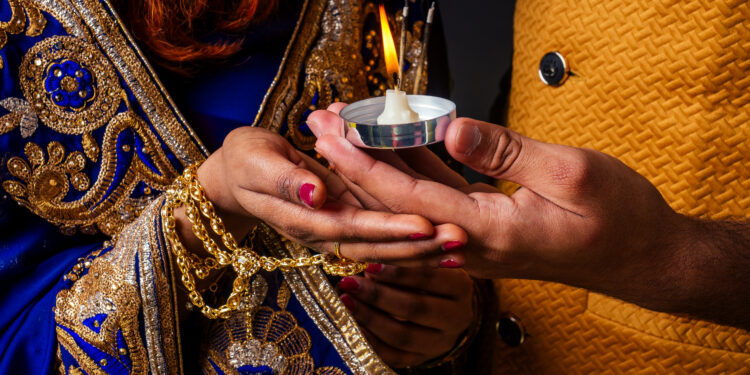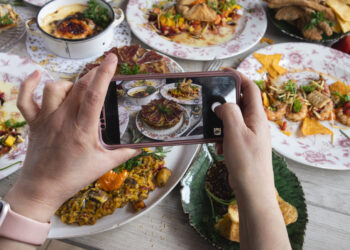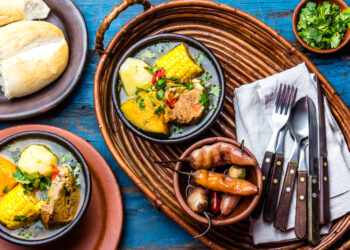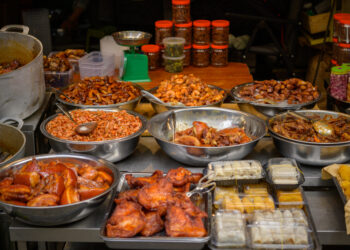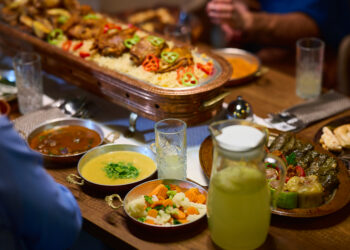Karva Chauth in the UK is more than a fast; it’s a cultural celebration of love, tradition, and togetherness within Indo-Caribbean and Indian diaspora households. From elaborate mehndi and sari shopping to moon-gazing through British clouds, couples adapt rituals with wit, devotion, and a dash of diaspora practicality. This guide explores history, rituals, modern twists, food, and how families in London, Birmingham, and beyond keep Karva Chauth glowing each October.
Karva Chauth in the UK
Karva Chauth in the UK has taken on a life of its own, part ritual, part romance, and part cultural performance under cloudy British skies. The festival, which sees married women (and, increasingly, their husbands too) fast from sunrise to moonrise, is a tradition rooted in devotion and endurance. But in diaspora households, it’s more than a nod to heritage; it’s a celebration of resilience, cultural adaptation, and, if you’re lucky, a cheeky samosa once the moon finally peeks out.
For Indo-Caribbean and Indian communities across London, Leicester, Birmingham, and Manchester, 9 October is a day of both discipline and delight. Women dress in their finest, mehndi artists do a roaring trade, and WhatsApp groups hum with “Has anyone spotted the moon yet?” updates.
The History & Meaning Behind Karva Chauth
Traditionally, Karva Chauth is about marital devotion — a fast observed by women for the health, prosperity, and long life of their husbands. But in today’s diaspora context, the meaning often stretches beyond that. Couples see it as a day of partnership, shared endurance, and reaffirmed love.
The symbolism of water, moonlight, and food all tie back to stories of devotion from Indian folklore. In Indo-Caribbean culture, where Hindu traditions travelled via ancestors, Karva Chauth feels both ancient and renewed — adapted for new generations in new lands.
Preparing for the Festival: Shopping, Mehndi & Outfits
The days leading up to Karva Chauth in the UK feel like a mini-Diwali. Local shops in Southall, Wembley, and Leicester stock colourful bangles, red and gold saris, and steel karvas (pots) ready for rituals. Mehndi artists open up temporary stalls, offering intricate designs that last long enough for Karva Chauth selfies but fade just in time for Diwali preparations.
Women often swap tips on where to buy kheer ingredients or the best dupatta for the evening puja. And while Amazon delivers the essentials in a pinch, most diaspora families prefer the buzz of local markets where the festival atmosphere is tangible.
The Fasting Ritual in Diaspora Life
The heart of Karva Chauth is the fast — no food, no water, from sunrise until moonrise. In the UK, that can mean an unpredictable waiting game. Some years, the moon is out early and clear; other years, it’s a night of pacing by the window, scanning weather apps, or calling cousins in another postcode to confirm sightings.
Diaspora couples add their own humour to the ritual. Husbands might join their wives in fasting — either out of solidarity or because secretly they enjoy the romantic bragging rights. Others play the dutiful role of preparing the evening thali (plate) and fumbling adorably with the sieve used during the moon-viewing ritual.
Diaspora Adaptations: The Modern Karva Chauth
Karva Chauth in the UK has evolved. For many younger couples, the emphasis is less on sacrifice and more on shared celebration. Some couples treat it like Valentine’s Day with cultural flair — fasting together, then breaking it with a lavish Indo-Caribbean-Indian fusion meal.
Restaurants across London and Birmingham even offer special Karva Chauth thalis, complete with kheer and mithai, so that couples can combine tradition with a touch of convenience. Social media has also reshaped the day: Instagram reels capture the moment the moon appears, while TikTok thrives with playful “husband spots the moon first” skits.
The Food: From Fasting to Feasting
The post-moon meal is the true reward. Diaspora kitchens fill with fragrant curries, puris, kheer, and sweets. Caribbean-Indian households might add pholourie, roti, or dhal puri alongside the more traditional sabzis.
Popular UK-based indulgences include:
- Kheer under the moonlight – rice pudding, often left outdoors to absorb moonlight’s symbolic energy.
- Fasting-friendly fruits and nuts – once the moon is sighted, dates and almonds are the first bites.
- Fusion feasts – think curry crab with puris, or dhal alongside paneer makhani.
- Sweet treats – ladoos, jalebi, and barfi, sometimes paired cheekily with British biscuits for younger generations.
Karva Chauth in London, Birmingham & Beyond
- London: Southall becomes the hub, with sari shops, mehndi stalls, and gurdwaras buzzing with activity. Evening pujas see women gather with decorated thalis, their bangles chiming as prayers are shared.
- Birmingham: Diaspora families often host collective Karva Chauth evenings, where friends and relatives join in, ensuring no one fasts or feasts alone.
- Leicester & Manchester: Smaller communities gather in temples, blending the solemnity of prayer with the joy of reunion.
Even in quieter towns, the ritual thrives in living rooms where families gather via video calls, bridging distances and keeping tradition alive.
The Role of Men: From Spectators to Partners
Traditionally, Karva Chauth is a women’s fast, but in the diaspora, men are stepping up. Some fast, some cook, some simply act as moon-spotting scouts. But across the board, husbands are recognising it less as a passive tradition and more as an opportunity to show partnership and care.
This modern shift makes Karva Chauth in the UK not only about marital devotion, but also about equality, shared effort, and playful togetherness.
Wit & Weather: The British Moon Problem
If Karva Chauth in India is all about timing and ritual, in the UK it’s often about weather and patience. Cloudy skies are legendary mood-spoilers. Many diaspora couples recall standing in gardens, peering hopefully at grey skies, or resorting to live-streaming the moon from India on YouTube as a stand-in.
And yet, this unpredictability has its charm. It creates moments of laughter, storytelling, and togetherness that make each year memorable. After all, who else gets to say their romantic ritual included checking the Met Office forecast?
Generational Shifts: Younger Diaspora Views
For first-generation immigrants, Karva Chauth is about preserving a cherished link to heritage. For younger generations, it’s about adapting tradition to fit modern lifestyles. Some see it as a spiritual fast, others as a cultural festival of love.
Either way, the symbolism endures: fasting, waiting, and then breaking bread together remains a powerful act of connection. Younger diaspora couples often reinterpret Karva Chauth as a day of wellness, mindfulness, and shared intention — less rigid, but equally meaningful.
Karva Chauth in Indo-Caribbean Homes
Indo-Caribbean communities bring their own rhythm to Karva Chauth in the UK. With deep ties to both Indian and Caribbean culture, the festival here blends the devotional fasting with a Caribbean sense of warmth and gathering. Families may mix chutneys with mithai, or set the moonlight thali alongside pepper roti and sorrel drinks.
The celebration becomes less about strict adherence and more about joy, memory, and community — proving that culture, once transplanted, doesn’t just survive but flourishes in creative new forms.
Why Karva Chauth Matters in the UK?
At its heart, Karva Chauth is about love, devotion, and cultural pride. In the UK, where identities weave across generations and continents, the festival provides a grounding sense of continuity. It reminds diaspora families that even in a new land, traditions can thrive — sometimes with extra spice, sometimes with added humour, always with meaning.
Conclusion: A Moonlit Promise
Karva Chauth in the UK shows how traditions adapt, evolve, and glow anew under different skies. Whether it’s observed with solemn devotion, playful Instagram reels, or a hearty Indo-Caribbean feast, the festival embodies togetherness.
When couples look skyward and finally catch a glimpse of the moon through Britain’s famously stubborn clouds, the fast ends, but the celebration of love continues.
Follow CurryBien.co.uk for more cultural deep-dives, diaspora stories, and recipes that connect tradition with today’s Indo-Caribbean life in the UK.


